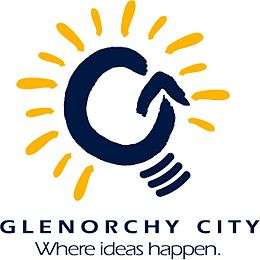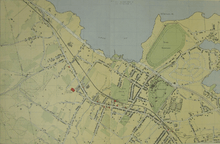Glenorchy City
| City of Glenorchy Tasmania | |||||||||||||
|---|---|---|---|---|---|---|---|---|---|---|---|---|---|
 | |||||||||||||
| Coordinates | 42°49′48″S 147°13′48″E / 42.83000°S 147.23000°ECoordinates: 42°49′48″S 147°13′48″E / 42.83000°S 147.23000°E | ||||||||||||
| Population | 45,827 (2015 Est)[1] | ||||||||||||
| • Density | 378.4/km2 (980/sq mi) | ||||||||||||
| Established | 1964 | ||||||||||||
| Area | 121.1 km2 (46.8 sq mi) | ||||||||||||
| Mayor | Kristie Johnston | ||||||||||||
| Council seat | Glenorchy | ||||||||||||
| Region | Hobart northern suburbs | ||||||||||||
| County | Buckingham | ||||||||||||
| State electorate(s) | Denison | ||||||||||||
| Federal Division(s) | Denison | ||||||||||||
 | |||||||||||||
| Website | City of Glenorchy | ||||||||||||
| |||||||||||||
The City of Glenorchy is a local government area of Tasmania which covers several northern suburbs of Hobart including the suburb of Glenorchy by the same name. The city is managed by Glenorchy City Council. Currently the mayor is Kristie Johnston, the Deputy Mayor is former Federal Parliamentarian Harry Quick.
Alderman
The alderman of Glenorchy City Council (listed below) were elected in October 2014, they will serve a four-year term:
- Ald. Jenny Branch-Allen (first elected 2007)
- Ald. Jan Dunsby (first elected 2014)
- Ald. Kristie Johnston (first elected 2011; Mayor since 2014)
- Ald. Steven King (first elected 2008)
- Ald. Christine Lucas (first elected 1994; Deputy Mayor 2009-2011)
- Ald. Haydyn Nielson (first elected 2006; Deputy Mayor 2011-2014)
- Ald. David Pearce OAM JP (first elected 1999)
- Ald. Harry Quick (first elected 2014; Deputy Mayor since 2014)
- Ald. Stuart Slade (first elected 1991; Mayor 2011-2014, Deputy Mayor 1996-2005)
- Ald. Matt Stevenson (first elected 2010)
History

Tasmanian Aboriginals were the first inhabitants of the area where Glenorchy lies today. The first European to arrive in Glenorchy was a Frenchman, who was a member of Bruni d'Entrecasteaux's crew, in 1793.[2] An English expedition arrived two months later, under the command of John Hayes. Hayes sailed up the river which he referred to as the Derwent. He named Prince of Wales Bay and called the area around New Town and Moonah, King George's Plains. Hayes named the Glenorchy area as New Cumberland.[2]
This French presence was the main influence in Lieutenant Governor Bowen's decision to settle where Hobart now exists.
The period between 1840 and 1860 was where steady growth was seen in Glenorchy, culminating in the area becoming a municipality in 1864. Glenorchy is believed to have been so named by governor Lachlan Macquarie after his wife's home in Scotland. The name means 'glen of tumbling waters'.[2]
City status was given to Glenorchy on 24 October 1964, exactly one hundred years after it was first proclaimed a municipality.[2]
Geography
The city spans the area along the Derwent River, from just north of the Queens Domain in the south, to the Bridgewater Bridge and Causeway in the north, and extends west as far as the foothills of Mount Wellington.
Demographics
The greater Hobart area has a population of around 211,656 (Census 2011) people. The city of Glenorchy local government area has a population of 44,656,[3] making Glenorchy the third most populated city in the greater area of Hobart.
| Glenorchy population by year | ||
|---|---|---|
| 1865 | 1300 | |
| 1891 | 1962 | |
| 1901 | 2392 | |
| 1911 | 3393 | |
| 1921 | 6344 | |
| 1933 | 9898 | |
| 1947 | 14493 | |
| 1954 | 25810 | |
| 1964 | 38400 | |
| 1971 | 42,651 | |
| 1976 | 42,437 | |
| 1981 | 41,019 | |
| 1986 | 38202 | |
| 2001 | 42445 | |
| 2006 | 43413 | |
| 2011 | 44,656 | |
Road Infrastructure
A greater proportion of all roads found within the boundaries of Glenorchy are owned by the city itself with the two exceptions being Goodwood Road and the Brooker Highway which are owned and maintained by the Tasmanian Government.[4]
Culture
Events
The city hosts several annual events, including a regatta at Montrose Bay while at the showgrounds there is the annual Royal Hobart Show and the Hobart Cup at Tattersalls Park.
Entertainment
Glenorchy has a huge amount of entertainment to offer, considering its size. Located on the main road there is the only ice rink in the greater area of Hobart, as well as a Village Cinemas complex at Glenorchy Central and an AMF Bowling Center at Moonah.
The Derwent Entertainment Centre provides the city with the opportunity to host many local and international artists. Some of the artists that have played here include: Dire Straits, INXS, Elton John, John Farnham, Kylie Minogue and Bob Dylan. The DEC is also used for expos, trade shows and sporting events.
The Moorilla Estate often holds musical performances during the period of summer. Some of the artists that have played at this venue include: Grinspoon, Paul Kelly and The Pretenders.
The Museum of Old and New Art (MONA) opened on the Moorilla estate in 2011, and quickly became a popular tourist attraction.
Sport
KGV Oval is just one of the places where sport is played seriously within the city.
Education
Senior secondary colleges in the Glenorchy area include St Virgil's College, on the northern side of the city; Montrose Bay High School located at Rosetta; Cosgrove High School, Dominic College and Guilford Young College close to the city center; and Claremont College slightly to the north at Claremont.
Shopping and Retail
The city of Glenorchy has the second largest shopping district in southern Tasmania (the largest being in Hobart).The city has three Major commercial areas include Moonah, Glenorchy CBD and Claremont. Claremont has one main shopping center (Claremont Village) and a few retail outlets. Moonah has 3 arcades, 2 Department stores (Harris Scarfe and Harvey Norman,and Beacon Lighting stores in Tasmania, and a new shopping center has been built in the area of the old Woolworths supermarket, featuring a new updated one. The Glenorchy CBD has three major indoor shopping centres, Northgate Shopping Centre, Glenorchy Central (Centro), and Glenorchy Plaza.
References
- ↑ "3218.0 – Regional Population Growth, Australia, 2014–15". Australian Bureau of Statistics. Retrieved 29 September 2016.
- 1 2 3 4 "Glenorchy City council heritage". Glenorchy City Council. 2006. Archived from the original on 2006-12-08. Retrieved 2007-03-31.
- ↑ Australian Bureau of Statistics (31 October 2012). "Glenorchy (C) (LGA)". 2011 Census QuickStats. Retrieved 2012-09-10.
- ↑ "City Of Glenorchy Traffic". Glenorchy City ouncil. 2006. Archived from the original on 2006-10-17. Retrieved 2007-03-31.